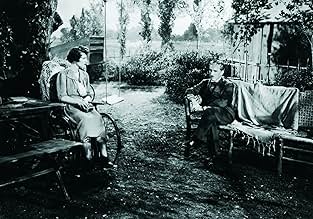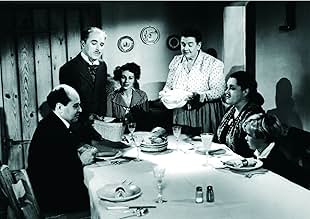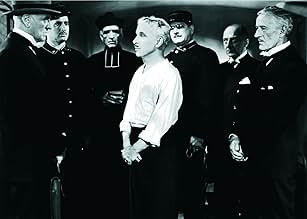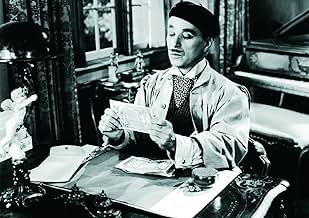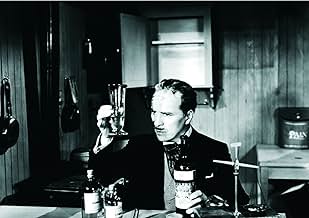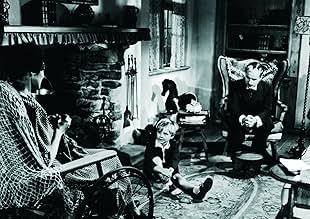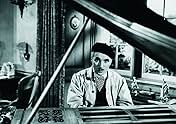CALIFICACIÓN DE IMDb
7.8/10
20 k
TU CALIFICACIÓN
Un hombre afable pero egoísta se casa por dinero con mujeres ricas y las mata para mantener su familia, pero ese trabajo conlleva algunos riesgos ocupacionales.Un hombre afable pero egoísta se casa por dinero con mujeres ricas y las mata para mantener su familia, pero ese trabajo conlleva algunos riesgos ocupacionales.Un hombre afable pero egoísta se casa por dinero con mujeres ricas y las mata para mantener su familia, pero ese trabajo conlleva algunos riesgos ocupacionales.
- Nominado a 1 premio Óscar
- 5 premios ganados y 1 nominación en total
Ada May
- Annette - Her Maid
- (as Ada-May)
Bernard Nedell
- Prefect of Police
- (as Bernard J. Nedell)
- Dirección
- Guionistas
- Todo el elenco y el equipo
- Producción, taquilla y más en IMDbPro
Argumento
¿Sabías que…?
- TriviaVerdoux's quote "One murder makes a villain; millions a hero" is taken from the abolitionist Bishop Beilby Porteus (1731-1808).
- ErroresAlthough the story takes place in the years 1932-1937, all the women's fashions and hairstyles are of the 1946-1947 styles, when the film was made.
- Citas
Henri Verdoux: Wars, conflict - it's all business. One murder makes a villain; millions, a hero. Numbers sanctify, my good fellow!
- Versiones alternativasThe West German theatrical version was cut by approximately 15 minutes.
- ConexionesFeatured in Amor ciego (2001)
Opinión destacada
It would be hard to imagine anyone else playing Monsieur Verdoux; Charlie Chaplin was the only one who could pull it off in any form or style or way that wouldn't make the character as just an unlikeable killer of women. As it's written on the page the character, if played by someone with less charisma or charm or comic timing, would just be another character actor playing a villain. But Chaplin taking the part is inspired on his part, and it's a good thing too (and I never thought I'd say this) that he didn't let Orson Welles direct. With Welles it obviously would have been a visually awesome picture, but would the comedy be the same? Or the emphasis on the social message blending in with the ultimate sanctimonious attitude of the character? It would be interesting to see Welles script, if it exists, but as it stands he's mostly a footnote in his tale, if a thankful one.
Under Chaplin's direction and writing Monsieur Verdoux is timed with finesse and glee and with a repetitive transition of the train going by quickly with Chaplin's piano key strokes, and it's often devilish fun to hear how Chaplin's Verdoux gets around and about (or sometimes not) killing and robbing his victims. And yet, I'm inclined to say that it's above all else a triumph for Chaplin as an actor, a performer who's iconic appeal, even past the Tramp character, makes us (or at least me) almost cheer him on or feel awkward or cringing during a scene leading up to a murder, or, as does happen once or twice, not. He knows how to put on an air that's genuine, even as it's the most blatant con, and he does it with a gentleman's manner hiding his desperate-times-call-for-desperate-measures ex-bank clerk. While I wouldn't go as far as James Agee in calling it the greatest male performance ever, it might just be my favorite Chaplin performance, full of ranging subtleties and over-the-top expressions and just lingering looks of contempt and malaise and sorrow and outright lying and etc that are just a knockout.
Monsier Verdoux is a peculiar character, as his crimes are meant to be for the good of his wife and child who, of course, have no idea of what he's really doing (in an acidic touch, his wife is also crippled). Is it wrong what he's doing? In the legal sense, of course. But Chaplin sets up a moral code for this character that makes things trickier, a little warped in thinking. If the woman has lots of wealth stored away- and maybe, as with the one who keeps getting away via wine glass and fishing trip, almost deserving in the perception of the character- why carp? But then there's the woman who's just out of prison, her husband's gone, nothing to her name, and... he just can't bear to do her in (especially, as should be noted, as a "test" run for another victim). It becomes curious to see her later on, sort of as the not-quite Chaplin heroine of the story, and how saving the right one for Verdoux is what counts, despite forgetting her until she reappears.
So there's this twisted logic, but in the set-pieces that Chaplin sets up are some of the finest, most brilliantly timed comic moments of his career, filmed for a dark suspense tinged with a near sweetness that we know and love from him. It's satire on a level that is no more or less sophisticated than Chaplin's major silent works, and yet it's just a little sharper, more pointed at the ills of man in turmoil than a simple psychopath, all in the realm of delightful crimes in the upper class. While the end may seem derivative of the Great Dictator with a speech and message chocked forward like spray-paint on a wall, it's a mixed reaction one might have; the sanctimonious attitude, of being accepting and pointing the finger back on society, is haunting and obvious and also, importantly, speaks to the nature of the character. Would a man somewhat comfortable in his own mortality face the end any other way?
Under Chaplin's direction and writing Monsieur Verdoux is timed with finesse and glee and with a repetitive transition of the train going by quickly with Chaplin's piano key strokes, and it's often devilish fun to hear how Chaplin's Verdoux gets around and about (or sometimes not) killing and robbing his victims. And yet, I'm inclined to say that it's above all else a triumph for Chaplin as an actor, a performer who's iconic appeal, even past the Tramp character, makes us (or at least me) almost cheer him on or feel awkward or cringing during a scene leading up to a murder, or, as does happen once or twice, not. He knows how to put on an air that's genuine, even as it's the most blatant con, and he does it with a gentleman's manner hiding his desperate-times-call-for-desperate-measures ex-bank clerk. While I wouldn't go as far as James Agee in calling it the greatest male performance ever, it might just be my favorite Chaplin performance, full of ranging subtleties and over-the-top expressions and just lingering looks of contempt and malaise and sorrow and outright lying and etc that are just a knockout.
Monsier Verdoux is a peculiar character, as his crimes are meant to be for the good of his wife and child who, of course, have no idea of what he's really doing (in an acidic touch, his wife is also crippled). Is it wrong what he's doing? In the legal sense, of course. But Chaplin sets up a moral code for this character that makes things trickier, a little warped in thinking. If the woman has lots of wealth stored away- and maybe, as with the one who keeps getting away via wine glass and fishing trip, almost deserving in the perception of the character- why carp? But then there's the woman who's just out of prison, her husband's gone, nothing to her name, and... he just can't bear to do her in (especially, as should be noted, as a "test" run for another victim). It becomes curious to see her later on, sort of as the not-quite Chaplin heroine of the story, and how saving the right one for Verdoux is what counts, despite forgetting her until she reappears.
So there's this twisted logic, but in the set-pieces that Chaplin sets up are some of the finest, most brilliantly timed comic moments of his career, filmed for a dark suspense tinged with a near sweetness that we know and love from him. It's satire on a level that is no more or less sophisticated than Chaplin's major silent works, and yet it's just a little sharper, more pointed at the ills of man in turmoil than a simple psychopath, all in the realm of delightful crimes in the upper class. While the end may seem derivative of the Great Dictator with a speech and message chocked forward like spray-paint on a wall, it's a mixed reaction one might have; the sanctimonious attitude, of being accepting and pointing the finger back on society, is haunting and obvious and also, importantly, speaks to the nature of the character. Would a man somewhat comfortable in his own mortality face the end any other way?
- Quinoa1984
- 8 jul 2008
- Enlace permanente
Selecciones populares
Inicia sesión para calificar y agrega a la lista de videos para obtener recomendaciones personalizadas
- How long is Monsieur Verdoux?Con tecnología de Alexa
Detalles
- Fecha de lanzamiento
- País de origen
- Sitios oficiales
- Idiomas
- También se conoce como
- Monsieur Verdoux
- Locaciones de filmación
- Productora
- Ver más créditos de la compañía en IMDbPro
Taquilla
- Presupuesto
- USD 2,000,000 (estimado)
- Total en EE. UU. y Canadá
- USD 64,636
- Total a nivel mundial
- USD 65,718
- Tiempo de ejecución2 horas 4 minutos
- Color
- Relación de aspecto
- 1.37 : 1
Contribuir a esta página
Sugiere una edición o agrega el contenido que falta

Principales brechas de datos
By what name was Monsieur Verdoux, el moderno Barba Azul (1947) officially released in India in English?
Responda

